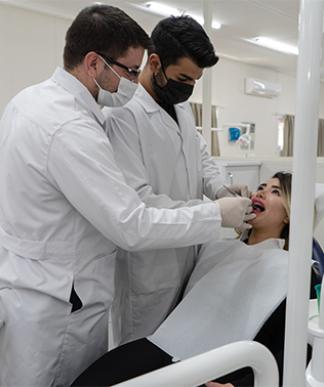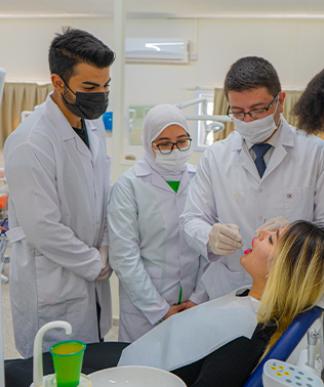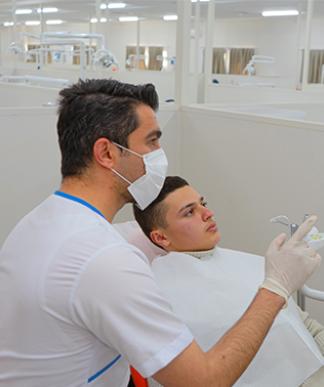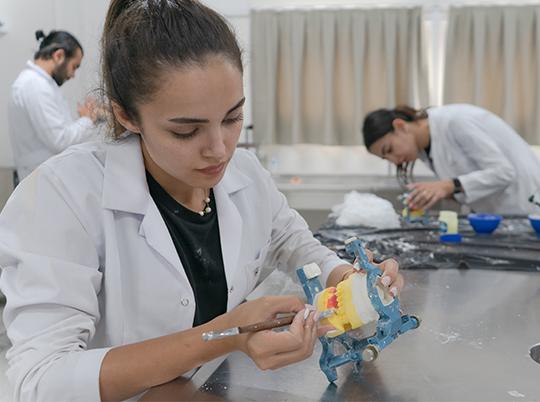


About the Program
The doctoral program of Oral Maxillofacial Surgery offered by the Institute of Graduate Studies and Research at Cyprus International University aims to train advanced specialist dentists who can provide advanced health services to the society in the diagnosis and surgical treatment methods of oral and peripheral tissue patients, authentic, using knowledge by adhering to ethical rules, and lifelong education awareness.
Education Opportunities
The program education covers knowledge and skill applications such as the treatment of oral soft tissue and jawbone patients, the application of dental implants, jaw and facial aesthetics, jaw joint diseases.

Career Areas
Graduates of the Oral and Maxillofacial Surgery doctorate program can work in hospitals, service clinics, private dental clinics, research, and development industry affiliated with the Ministry of Health, and they can continue their academic studies as academics in higher education institutions.
Contact
Institute of Graduate Studies and Research
Graduate Sciences and Education Center, GE106
Tel: +90 392 671 1111 Extension: 2776
Institute E-mail: ciu-institute@ciu.edu.tr
Compulsory Courses
First Semester
DENTOALVEOLAR SURGERY-I
Course code
MFCS601Credit
4Theoretical
4Practical
2Ects
6HEAD AND NECK INFECTIONS
Course code
MFCS603Credit
4Theoretical
4Practical
2Ects
6ANESTHESIA IN SURGERY
Course code
MFCS605Credit
3Theoretical
2Practical
2Ects
4AREA ELECTIVE
Course code
MFCS7X1Credit
0Theoretical
0Practical
0Ects
10AREA ELECTIVE
Course code
MFCS7X3Credit
3Theoretical
3Practical
0Ects
4Second Semester
ORAL IMPLANTOLOGY IN SURGERY
Course code
MFCS602Credit
4Theoretical
4Practical
2Ects
6DENTOALVEOLAR SURGERY-II
Course code
MFCS604Credit
4Theoretical
4Practical
2Ects
6MAXILLOFACIAL TRAUMATOLOGY
Course code
MFCS606Credit
3Theoretical
2Practical
2Ects
4AREA ELECTIVE
Course code
MFCS7X2Credit
0Theoretical
0Practical
0Ects
10AREA ELECTIVE
Course code
MFCS7X4Credit
3Theoretical
3Practical
0Ects
4Third Semester
ORTHOGNATHIC SURGERY
Course code
MFCS607Credit
4Theoretical
4Practical
2Ects
6TEMPOROMANDIBULAR JOINT DISORDERS AND TREATMENTS
Course code
MFCS609Credit
4Theoretical
4Practical
2Ects
6SEMINAR
Course code
MFCS611Credit
0Theoretical
0Practical
0Ects
5AREA ELECTIVE
Course code
MFCS7X5Credit
0Theoretical
0Practical
0Ects
10AREA ELECTIVE
Course code
MFCS7X7Credit
2Theoretical
2Practical
0Ects
3Fourth Semester
DOCTORAL PROFICIENCY
Course code
MFCS608Credit
0Theoretical
0Practical
0Ects
20AREA ELECTIVE
Course code
MFCS7X6Credit
0Theoretical
0Practical
0Ects
10Fifth Semester
THESIS STUDY
Course code
MFCS610Credit
0Theoretical
0Practical
0Ects
120ROTATION DUTIES IN MEDICAL DEPARTMENTS-I
Course code
MFCS612Credit
0Theoretical
0Practical
0Ects
15Sixth Semester
ROTATION DUTIES IN MEDICAL DEPARTMENTS-II
Course code
MFCS613Credit
0Theoretical
0Practical
0Ects
0Seventh Semester
CLINICAL STUDY IN DOCTORAL FIELD-I
Course code
MFCS614Credit
0Theoretical
0Practical
0Ects
0Eighth Semester
CLINICAL STUDY IN DOCTORAL FIELD-II
Course code
MFCS615Credit
0Theoretical
0Practical
0Ects
0Elective Courses
CLINICAL APPLICATIONS-I
Course code
MFCS701Credit
0Theoretical
0Practical
0Ects
10CLINICAL APPLICATIONS-II
Course code
MFCS702Credit
0Theoretical
0Practical
0Ects
10ORAL DISEASES AND PATHOLOGY-I
Course code
MFCS703Credit
3Theoretical
3Practical
0Ects
4ORAL DISEASES AND PATHOLOGY-II
Course code
MFCS704Credit
3Theoretical
3Practical
0Ects
4Entry Requirements
- The prospective student agrees that she/he shall apply to YÖK or YÖDAK for the equivalency of their undergraduate diplomas.
- The prospective student agrees that she/he shall apply to the Association of Turkish Cypriot Doctors in order to become a temporary member.
- The prospective international student agrees that she/he shall provide a Turkish Language Certificate or shall attend the Turkish Proficiency Test or shall study for a year for Turkish language education in order to continue their clinical studies. During their Turkish language study, students shall take one PhD course per semester for their PhD in Dentistry program.
- Prospective students agree that she/he shall provide an English Language Certificate (IELTS 6.0) or shall attend the English Proficiency Test which is organized by the School of Modern Languages. According to their success, students shall continue to the first year of the program or shall study the English language.
- Prospective students agree that she/he shall accept to work at least 20 hours per week during their PhD study and this clinical duty shall continue for 46 weeks per year.
- Prospective students agree that she/he shall accept buying clinical dentistry units with a written commitment.
- Surgery prospective students agree that she/he shall accept to comply with a two-semester (9 months) rotation duty in a full-fledged hospital.
- If necessary, Prospective students agree that she/he shall attend an online interview about the basic dental knowledge of the relevant field.
- Prospective students agree that she/he shall comply with clinical working programs with a written commitment.
- Prospective students agree that she/he shall comply with a written commitment to obeying professional and ethical responsibilities and not to cause malpractice conditions.
Cyprus International University provides academic scholarships for its students as an incentive for success, with most students benefiting from 50%, 75% or 100% scholarships or discounted tuition fees. Click for more information.
Tuition Fees are determined at the beginning of each academic year. Candidate students who are entitled to enroll in CIU can learn their fees in line with the Tuition Fee Calculation system.